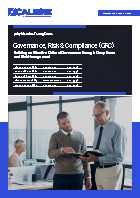| Date | Venue | Fee | |
|---|---|---|---|
| 11 May - 15 May 2026 | Istanbul - Turkey | $ 5,950 | Register Now |
| 10 Aug - 14 Aug 2026 | Dubai – UAE | $ 5,950 | Register Now |
| 16 Nov - 20 Nov 2026 | Dubai – UAE | $ 5,950 | Register Now |
About the Course
This Governance, Risk & Compliance (GRC) training course will explain the governance tools of Risk Management, Compliance, and Internal Audit, their added value, the obstacles, and how to implement them practically and successfully. It will provide a framework and strategy for implementing robust GRC practices and procedures within your organisation, looking at best practices to identify, analyse, and resolve current issues whilst building a dynamic future system. Likewise, it will cover building an effective and active Audit Committee, monitoring the Internal Audit, Risk Management, and Compliance functions in order to achieve cooperation among these functions and improve the CG process within the organisation.
Furthermore, it is structured to enhance a complete understanding of the ideologies and methods of Risk Management, Compliance & Internal Audit within Corporate Governance; it aims at attaining and improving the concepts, roles, tools, added value, and functions of the governance environment tools within an organisation distinguishing between Compliance, Risk Management, and Internal Audit roles in achieving cooperation among these functions and improving their process and harmony; not only to provide an all-round advanced-level exposure to critical areas of GRC but also to broader trends across regulatory areas.
Core Objectives
Delegates will achieve the following objectives:
- Understand fundamental concepts of corporate governance, its guiding principles, and content elements
- Improve alignment with mission, vision, and values of the organisation
- Gain knowledge about Audit Committee skills and responsibilities
- Assimilate the risk management taxonomies
- Implement the new compliance approach; risk-based compliance
- Enhance convergence of corporate governance components
- Realise the relationship among risk management, internal audit, and compliance relationship
- Link corporate governance to organisational risk considerations, international frameworks, and standards to provide an organisation-specific, risk-focused entity
Training Approach
This training course is driven by a blended learning approach and draws on various adult learning techniques such as action learning, experiential exercises, group discussions, video case studies, role play, and self-reflection activities. The resulting variety helps delegates stay engaged throughout the course, feel challenged, and draw quick wins for their development. It also ensures delegates are exposed to ample opportunities to apply what they learn to the real-world challenges they face in the workplace.
The Attendees
This training course has been researched and developed for Directors, Managers, Superintendents, Supervisors, Planners, Team Leaders, Project Coordinators, Human Resource Management, and Sales & Marketing for both technical and non-technical departments across all industries.
Likewise, it will be valuable to the professionals but not limited to the following:
- Executives and Board Members
- Board Secretaries
- Governance Officers and Managers
- Risk Managers and Officers
- Regulatory Compliance Officers
- Internal Auditors
- Governance Professionals
- Legal Professionals
- Regulatory Representatives
Daily Discussion
DAY ONE: CORPORATE GOVERNANCE – BENEFITS & BARRIERS
- Corporate Governance: Definition, Concepts, Rules, and Principles
- Building Corporate Governance Framework
- Corporate Governance Committees
- The Added Value of Corporate Governance
- Board of Directors
- All that you need to know about
- Role of the Regulators
- Board Models: Passive Board, Certifying Board, Engaged Board, Intervening Board, and Operating Board
- The objectives of the Financial Services Regulation
- Audit Committee: Roles and Responsibilities
- What should audit committee members focus on?
- What are the benefits of an audit committee?
- Risk Management Committee
- Remuneration and Nomination Committee
- Review of Regular Reports and Implementation
DAY TWO: RISK MANAGEMENT, COMPLIANCE & INTERNAL AUDIT TRIANGLE – THE EVOLUTION OF INTERNAL AUDITING TOWARDS
- Enterprise Risk Management in Brief
- Compliance and Internal Audit in Brief
- Audit and Governance Arrangements
- Risk Management and Risk Appetite Measures
- Compliance and Regulator's Requirements
- New Methodology: Risk-Based Audit Approach
- Determination of Internal Auditing Universe
- Risk Mapping/Risk Registration
- Annual Audit Plan Approval
- Audit the Control Environment
DAY THREE: RISK-BASED COMPLIANCE
- Compliance Definition, Responsibilities, and Goals
- What duty, objective, and responsibility does a Compliance Officer fulfill?
- What are the five key functions of a Compliance Department?
- What does the term ‘Regulator' mean?
- High-risk Areas for Compliance Department
- Establishing Compliance Policies and Procedures
- Role of Other Departments towards the Compliance Department
- AML & CTF: Definition, Responsibilities, and Goals
- Money Laundering Threats and Methods
- Terrorist Financing Threats and Methods
DAY FOUR: RISK MANAGEMENT TAXONOMIES
- Fundamental Concepts, Universe & Framework of Enterprise Risk Management
- International standards for ERM and its Implementation Challenges
- Risk Control Self-Assessment (RCSA) and Heat Map
- Key Risk Indicators vs. Key Performance Indicators
- Business Continuity Plan vs. Disaster Recovery Plan
- Credit and Financial Risks
- Operational and Legal Risks
- Political, Sovereign Risks, and Country Risk
- Ethical Risks and Fraudulent Risks
- Non-compliance Risks and Reputational Risks
DAY FIVE: ROLE & RESPONSIBILITIES OF THE RISK CHAMPION
- Creating Job Description of a Risk Champion: Objectives, roles, and responsibilities
- Competency/Knowledge
- Typical Education, Skills, and Experience
- Framework, Perception, and Resources
- Business and Financial Lessons Learnt from Crisis & Epidemics
- Board Role at the Crisis
- Audit Committee at the time of Pandemic
- Business Continuity Plan: Periodical Reviews and Revisits
- Recommendations for Successful Corporate Governance
Certificate Awarded
Upon successful completion of this training course, participants will be awarded a Certificate of Completion from XCalibre Training Centre, acknowledging their accomplishment. This certificate serves as a testament to their dedication to developing their skills and advancing their expertise in their respective fields.



